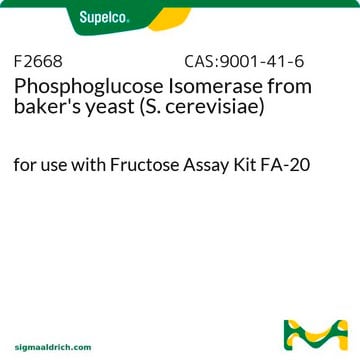P2621
Phosphomannose Isomerase from Escherichia coli
recombinant, expressed in E. coli, ammonium sulfate suspension, ≥50 units/mg protein
Synonym(s):
D-Mannose-6-phosphate ketol-isomerase, Mannose Phosphate Isomerase, PMI
Sign Into View Organizational & Contract Pricing
All Photos(1)
About This Item
MDL number:
UNSPSC Code:
12352204
NACRES:
NA.54
Recommended Products
recombinant
expressed in E. coli
Quality Level
form
ammonium sulfate suspension
specific activity
≥50 units/mg protein
storage temp.
2-8°C
Application
PMI is used to study cell wall synthesis and energy production. PMI has been used to study how EDTA and metal ions, such as Zn++, Co++, Fe++, Mn++ and Cu++., can affect recovery and thermal stability. It may be used to study PMI′s effect on various alginate biosynthetic enzymes such as phosphomannomutase (PMM), GDP-mannose pyrophosphorylase (GMP), and GDP-mannose dehydrogenase (GMD).
Biochem/physiol Actions
Phosphomannose Isomerase (PMI) catalyses the interconversion of mannose 6-phosphate (Man-6-P) and fructose 6-phosphate (Fru-6-P), which provides a link between glucose metabolism and mannosylation.
Packaging
Bottomless glass bottle. Contents are inside inserted fused cone.
Unit Definition
One unit will convert 1.0 μmole of D-mannose 6-phosphate to D-fructose 6-phosphate per min at pH 7.6 at 25 °C, using a coupled enzyme system with phosphoglucose isomerase and glucose-6-phosphate dehydrogenase.
Physical form
Supplied as a suspension in 3.2 M ammonium sulfate
Storage Class Code
12 - Non Combustible Liquids
WGK
WGK 1
Flash Point(F)
Not applicable
Flash Point(C)
Not applicable
Personal Protective Equipment
dust mask type N95 (US), Eyeshields, Gloves
Certificates of Analysis (COA)
Search for Certificates of Analysis (COA) by entering the products Lot/Batch Number. Lot and Batch Numbers can be found on a product’s label following the words ‘Lot’ or ‘Batch’.
Already Own This Product?
Find documentation for the products that you have recently purchased in the Document Library.
Yueqing Cao et al.
Journal of invertebrate pathology, 108(1), 7-12 (2011-06-21)
Phosphomannose isomerase (PMI) catalyzes the reversible interconversion of fructose 6-phosphate (Fru-6-P) and mannose 6-phosphate (Man-6-P), providing a link between glycolysis and the mannose metabolic pathway. In this study, we identified pmi gene (Mapmi) from the entomopathogenic fungus, Metarhizium acridum, and
Susanne Brunner et al.
Plant biotechnology journal, 9(8), 897-910 (2011-03-29)
Plant resistance (R) genes are highly effective in protecting plants against diseases, but pathogens can overcome such genes relatively easily by adaptation. Consequently, in many cases R genes do not confer durable resistance in agricultural environments. One possible strategy to
I Sá-Correia et al.
Journal of bacteriology, 169(7), 3224-3231 (1987-07-01)
The specific activities of phosphomannose isomerase (PMI), phosphomannomutase (PMM), GDP-mannose pyrophosphorylase (GMP), and GDP-mannose dehydrogenase (GMD) were compared in a mucoid cystic fibrosis isolate of Pseudomonas aeruginosa and in two spontaneous nonmucoid revertants. In both revertants some or all of
Soo-Jin Yeom et al.
Biochimie, 93(10), 1659-1667 (2011-07-07)
Mannose-6-phosphate isomerase catalyzes the interconversion of mannose-6-phosphate and fructose-6-phosphate. The gene encoding a putative mannose-6-phosphate isomerase from Thermus thermophilus was cloned and expressed in Escherichia coli. The native enzyme was a 29 kDa monomer with activity maxima for mannose 6-phosphate at
Thangamani Rajesh et al.
Applied microbiology and biotechnology, 93(4), 1685-1693 (2011-09-29)
Phosphomannose isomerases (PMIs) in bacteria and fungi catalyze the reversible conversion of D-fructose-6-phosphate to D-mannose-6-phosphate during biosynthesis of GDP-mannose, which is the main intermediate in the mannosylation of important cell wall components, glycoproteins, and certain glycolipids. In the present study
Articles
Instructions for working with enzymes supplied as ammonium sulfate suspensions
Our team of scientists has experience in all areas of research including Life Science, Material Science, Chemical Synthesis, Chromatography, Analytical and many others.
Contact Technical Service








